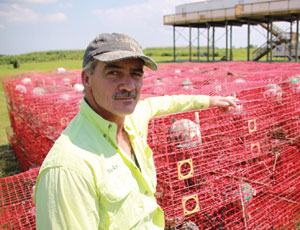As BP struggles to cap a leaking oil well in the Gulf of Mexico, the company is signing up fishermen onshore to help with cleanup.

Lanvin LeBlanc, a Lafitte, La., resident, is one of more than 700 fisherman signed on so far. He single-handedly runs a 38-ft shrimp skiff.
When officials closed the waters to all fishing between the mouth of the Mississippi River and Florida’s Pensacola Bay on May 2, LeBlanc effectively was put out of business. “This is all I’ve done my entire life. I’m 52 years old, and I’ve only worked [another] job twice in my life for a couple of months during the winter,” he says.
In Louisiana alone, commercial fishing is a $2.5-billion industry, the lifeblood of places like Lafitte, Shell Beach, Venice and Delacroix. “The fishermen cannot go through another [Hurricane] Katrina. If this oil kills our seafood, who knows how many years it will take to come back,” says commercial fishermen Nicky Alfonso.
Alfonso runs his skiff out of Delacroix, fishing along the mouth of the Mississippi for shrimp, oysters and crabs. He says most of his peers are barely hanging on, and, just before the spill, many dumped money into nets and boat maintenance in preparation for the season.
LeBlance took two classes, sent BP his contract and is waiting for a call. LeBlanc would earn $1,500 a day, plus fuel costs. Alfonso, though, is concerned about having to pay up front for his gas, which alone can run $600 per day.
“I worked for an oil company once before when I had my 90-foot boat, and it took me 130 days to get a check. I’d rather just fish,” said LeBlanc.


Post a comment to this article
Report Abusive Comment